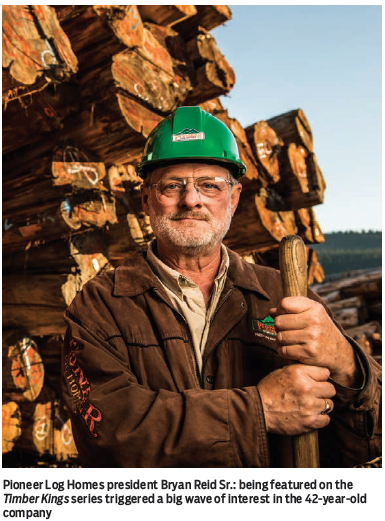Putting yourself front and centre in a television show will get people talking – and ordering.
Just ask Corin and Brian Mullins, the spouses who head Gibsons-based Hapi Foods Group, makers of Holy Crap cereal. An appearance on the CBC show Dragons’ Den allowed the company, which was used to selling $10,000 in products at weekend farmers markets, to make $1 million in the week after the show aired.
Two other businesses, Cupcakes in Vancouver and Pioneer Log Homes in Williams Lake, also reaped the benefits of the broadcast medium, though not as dramatically. The Cupcake Girls’ three-year run on the W Network (2010-12) helped owners Lori Joyce and Heather White increase their franchise and merchandising businesses. Pioneer Log Homes, featured in the two-year-old HGTV/Discovery reality series Timber Kings, has boosted its business with contracts coming from as far away as Moscow and Kazakhstan.
“We’ve always had orders from around the world, so it’s very hard to quantify,” said Bryan Reid Sr., president and founder of Pioneer Log Homes, which began constructing log houses from B.C. western red cedar in 1973. “We’re building a big home in Manitoba right now that’s directly a result of the show. We built two in Newfoundland last year, and I think the show was a factor.”
Timber Kings, produced by Vancouver’s Paperny Entertainment, is HGTV’s highest-rated show and airs across Canada, the U.S. (on Discovery), eastern and western Europe, Latin America, China and Hong Kong. Reid said that since it aired in France he gets 10 inquiries a week from that country, including four dealers “wanting to be our distributor.”
Cupcakes owners Joyce and White had been friends since their teens working at a store in Victoria. They talked about starting a business; a visit to a bakery convinced them they should make cupcakes. In April 2002, they opened a shop in Vancouver’s West End.
“ From the moment we opened the door, we were busy,” Joyce said.
While building their strong media presence – Joyce would routinely drop samples at media outlets – Joyce and White did a segment on the cable show The Shopping Bags.

Force Four Productions called them to do their own reality show. The Cupcake Girls debuted in 2010 on W and ran for three years, airing in almost 100 countries.
“A lot of women dream of starting a business, and they really connected with us on the show,” said Joyce, whose in vitro fertilization and pregnancy was featured in Season 1.
“Our fans are exactly like us, and they really lived vicariously through us.”
The show resulted in Cupcakes doubling its stores. Product and merchandise sales increased. But time demands forced Joyce and White to drop the show after three seasons.
Nothing can match the experience of Holy Crap’s Corin and Brian Mullins, who started their cereal company with $129 and made $40,000 a month from weekend markets (Sechelt and Granville Island) and modest online orders.
But an appearance on the CBC’s Dragons’ Den had their PayPal account immediately flooded within a week of the airdate.
“We had to hire 13 people right away, and seven not long after that,” said Corin Mullins.
In the four years since the show aired, Holy Crap has generated $25 million in sales, and every time the show is repeated, both in Canada and abroad, the company gets a fresh batch of orders.
The product is available in 2,500 stores, which will increase greatly late this year when the brand reaches U.S. store shelves. •




